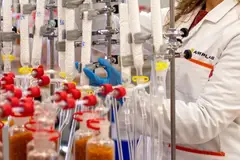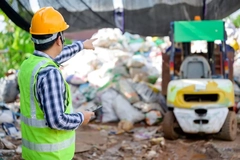Aimplas secures certification to award “industrially compostable” labels
Key takeaways
- Aimplas has been certified by Din Certco and BPI for industrial and home compostability testing.
- The certifications certify the industrial compostability of organic waste bags.
- Misleading greenwashing claims are under increased scrutiny amid high-profile lawsuits.

Aimplas, the Plastic Technology Centre, has received certification from Din Certco, allowing it to carry out tests that can award companies with “eco-labels” certifying the industrial compostability of organic waste bags.
Din Certco is the independent certification organization in the European bioplastic market. The recognition for Aimplas’s Biodegradation and Compostability Laboratory enables companies to market their products as industrially compostable.
Aimplas has also been recognized by the American organization BPI to conduct tests that allow companies to obtain certification for at-home compostability.
“Thanks to these certifications or eco-labels, companies can highlight that their products are environmentally sustainable in major global markets, as the organisations that have recognised Aimplas’ capabilities are among the most widely acknowledged worldwide and most sought after by companies,” says the company.
The certifications add to Aimplas’s previous recognition for conducting tests in accordance with the EN 13432 standard. The plastics research company can issue eco-labels certifying that a product is biodegradable or compostable in various environments without negatively impacting the environment.
Clarity for consumers
According to Aimplas, certifications and eco-labels can increase the value of products and companies, as they indicate a circular economy model increasingly demanded by consumers.
Awareness around the correct and accurate labeling of environmental benefits on packaging is increasing as regulations and lawsuits fight false advertising.
A common concern about bioplastics is their labeling and marketing, especially regarding terms like “biodegradable” and “compostable.” In an interview with Packaging Insights, Antonio Ordovás, packaging researcher at Aimplas, explained why biodegradability claims can be misleading.
“When a package is labeled as ‘biodegradable’ or ‘compostable,’ the first thing consumers often assume is that they can throw it in the organic bin and it will simply vanish without a trace. But the reality is far more complex,” he explains.
Greenwashing cases in 2025
Research suggests that while most consumers believe plastic packaging harms the environment, they also perceive plastic products marked with a “green” or “recyclable” logo as an environmentally positive choice.
Recent lawsuits have spotlighted the kind of “eco-labels” that could be considered as greenwashing. In September, ClientEarth accused Nestlé Poland of greenwashing over “misleading” slogans on its Polish bottled water brand Nałęczowianka.
Earlier this year, P&G was accused of “greenwashing” and “misleading” consumers with on-pack sustainability claims and undisclosed wood-sourcing practices, such as clear-cutting and chemical herbicide use.
Similarly, a UK regulatory agency banned online adverts by Lavazza UK and Dualit that described their coffee packaging as “compostable,” citing that the ads imply home compostability when they can only be composted through an industrial process.










